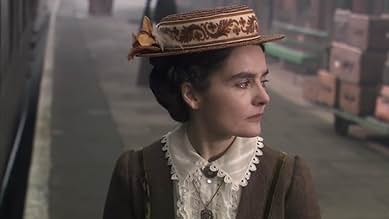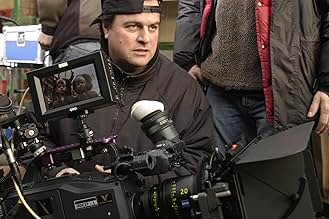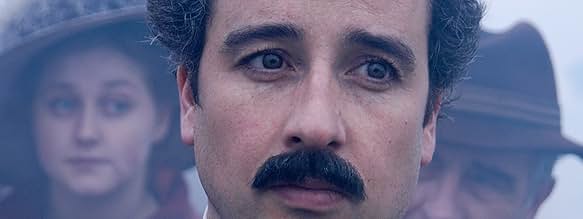This docudrama examines the history of scientific discovery that lead up to Albert Einstein's famous equation E=mc2 and its aftermath in the creation of nuclear energy. This includes Faraday... Read allThis docudrama examines the history of scientific discovery that lead up to Albert Einstein's famous equation E=mc2 and its aftermath in the creation of nuclear energy. This includes Faraday's discovery of electromagnetic fields; Antoine Lavoisier's discovery that mass is never l... Read allThis docudrama examines the history of scientific discovery that lead up to Albert Einstein's famous equation E=mc2 and its aftermath in the creation of nuclear energy. This includes Faraday's discovery of electromagnetic fields; Antoine Lavoisier's discovery that mass is never lost; and Emilie du Chatelet's demonstration that Newton's calculation of the velocity of a... Read all
- Director
- Writers
- Stars
- Humphry Davy
- (as Sam West)
- Professeur Fritz Muhlberg
- (as Mike Sarne)
- Director
- Writers
- All cast & crew
- Production, box office & more at IMDbPro
Featured reviews
I believe there are psychological sex differences, but we can't settle on what they are. That which is statistically measured (e.g., responses to questionnaires) may be trivial. Or the difference may be of great and obvious universal significance (e.g. anatomical and motivational aspects of the sex act).
Considering the obstacles to intellectual achievement and communication, that women were depicted in the program is a tribute to what may ultimately turn out to be a true statistical female intellectual superiority. There are some signs of it among school children. Or there may not be. It is hard to hold impinging variables constant. One thing is certain: women have been more capable than formerly they were almost universally believed to be.
In addition to social obstacles there was our dangerous biological role (which is much safer today). But what is allowable or encouraged differs greatly in different parts of the world. It has also changed greatly during the seven decades of my lifetime in this culture.
I want to find out how to contact the producers of this show to commend them on it!
After Benjamin Franklin's discovery of static electricity, the whole European science communities has begun working on the equations of force and mechanics. The plot grounds on Einstein's understanding of universe and how he differs from any scientist in the world. His courage of discovering the unknown and analyzing the inconceivable unites the Energy and the Mass, that no one could ever think of it. Einstein inspires from Michael Faraday, the founder of Electromagnetism and from James Clark Maxwell, the founder of the Celeritas(the speed of the light).
The plot makes the huge mistake with not mentioning Thomas Edison for the development of the storage of the electricity and the static light. However on the book the writer David Bodanis talks about Voltaire and Edison upon the same issue. Again without mentioning the Einstein's development of Quantum Mechanics, the plot takes us to the invention of Nuclear Fission by unlocking the Uranium atom, and thus to the Manhattan Project and the World War-II.
I found the storyline in such a mess, while trying to reveal Einstein's way of inspiration. It denies itself for the reason on the Light's traveling motion in space that is the square of its speed developed in numbers by a French academic 50 years before Einstein's developing the idea of taking the square measurement of light in order to find its motion in space. How could you develop a scientific thesis if its already accepted as a law 50 years before your thesis? As I know, no one else has ever thought of the light using it in a mathematical equation before Einstein. Anyway omitting this fallacy, I was fond of the explanation that the energy of an object can be described by its mass. It's said that the energy of an object equals to its mass multiplied by the square of the speed of the light. Because the rest is a mess, this documentary could have been a short film, if there would have been adequate personification of the characters introduced. Even though, it sure still is worth watching; and can fill out your expectations.
I have to agree with some other users when I acknowledge that the subject behind this docu-drama is fascinating but I must take issue with claims that this is a "great film" and all the "10 out of 10" votes that it has received on this site because the film itself is not worthy of the subject. It is hard not to be engaged by the basic history being delivered here, although it must be said that it is perhaps far too basic to be enjoyed by anyone who knows anything about the subject (which I pretty much don't). However it is the delivery that is the problem because this film is yet another in a recent spate of docu-dramas where dramatisations deliver history while experts contribute to flesh out the detail. Sadly, like other docu-dramas on channel 4 recently, the film relies too heavily on averagely acted dramatisations and not enough on the experts who are informed and passionate about the subject. The latter have just enough time to do the job (along with the narration) but the dramatisations are far too heavy and not helped at all by the score constantly pushing it to come across as more dramatic and exciting than it actually is. Often it seemed that the producers didn't totally trust the detail to be engaging enough.
Narrator Ecceleston veers between these two extremes. At times he provides solid narration but at others he tends towards hyping up the story for no real reason. The cast are reasonably mixed. Their performances are all good enough to act as a televisual live-exhibit (which is really what they are) but not good enough to do any more than this with a script that never required them to anyone. In fairness nobody is "bad" but it is hard to get past the fact that the narration and expert contributors are much more interesting and frustratingly given much less time to do their thing.
Overall then this is an OK film. It succeeds not on its own merits but on the value of the history and the people involved in developing the great ideas that we are swept through. Aiming for a wider audience is no bad thing but it is a shame that the film never lets the experts go into too much detail or to delve too deep, preferring instead to overdo the dramatisations. It will still be enough to engage some viewers but the lack of detail and the overdone re-enactments will put many off, as their main contribution is to distract rather than enrich.
Did you know
- TriviaThe movie was made to commemorate the 100th anniversary of the publication of Albert Einstein's paper in which he first outlined the theory of relativity.
- ConnectionsFeatures Nova: E=mc²: Einstein's Big Idea (2005)
Details
- Release date
- Countries of origin
- Official sites
- Language
- Also known as
- Великая идея Эйнштейна
- Filming locations
- Production companies
- See more company credits at IMDbPro































